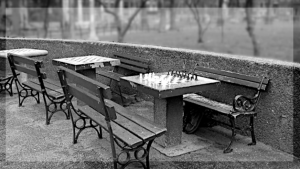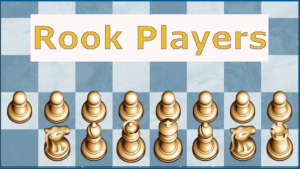|
February 10 commemorated the 150th birthday of Max Harmonist. I first came across Harmonist in I.A. Horowitz's book, "The Golden Treasury of Chess" and was entralled by the included game:
Max Harmonist
2-10-1864 - 10-16-1907
Berlin in the 1880s introduced to us a group of fantastic chess players who would soon help shape the history of the game.
In "Reflections Suggested by the Monte Carlo Tourney" by Emmanuel Lasker, published in "Checkmate," Feb. 1903, Emanuel Lasker had this to say:
In the beginning of the year 1880 several young men, most of them students, were accustomed to meet at a Berin café, and to devote their afternoons to the playing of chess games or the analysis of interesting positions. These young men (among whom were Dr. Tarrasch, C. von Bardeleben, Dr. B. Lasker, W. Cohn and Max Harmonist) created, on the foundation of the ideas of Steinitz, a style of their own, which at a later period withstood the fiery test of match play.
At that time German chess life was depressed by a deep disappointment. In the year 1881 preparations had been made for an international tourney in Berlin. Anderssen had been dead three years, and everyone had been speculating as to which of his pupils would take his place. But, alas! the strangers defeated the German masters. The depression that weighed on German chess life became still deeper in the following years. At Nuremberg in 1883, at Hamburg in 1885, at Frankfort-on-Alain in 1887 English and American visitors were the conquerors. But suddenly, and almost as an act of deliverance, the superiority of the strangers was ended.
It was at Breslau that in the summer of the year 1889 the change came. Then for the first time the youthful chess Siegfried donned his invulnerable coat of mail, and with his own good sword annihilated his enemies. The Siegfried was Dr. Siegbert Tarrasch and the coat of mail in which he enveloped himself was his confidence in the victorious might of consecutiveness in thought which was absolutely logical, and of objectivity in action which was absolutely definite. His coat of mail was invulnerable; in not a single game did its wearer succumb. Over this epoch-making performance the enthusiasm was great, all the more because it was only the beginning of still greater things. In the next year Dr. Tarrasch went to Manchester, where he vanquished his opponents in the same way. Then there followed an almost unbroken career of victory, right up to the Hastings tourney of 1895.
Lasker's praise of Tarrasch in 1903 seems strange to read in juxtaposition to their feud during the championship negotiation five years later.
For the sake or orientation, here are the ages of the players mentioned by Lasker above in the year 1880:
Siegbert Tarrarch - 18
Curt von Bardeleben - 19
Berthold Lasker - 20
Wilhelm Cohn - 21
Max Harmonist - 16
Emanuel Lasker, who doesn't include himself - 12
When he was 11, Lasker moved from his home to live with his brother, Berthold, to attend school in Berlin. He quickly learned to not just play chess but to excel in the game and soon helped to support himself playing for stakes at the Café Kaiserhof.
Of all the players mentioned Max Harmonist was the most unusual. He was a ballet dancer. Most references say for the Royal Ballet, but there was no Royal Ballet in Prussia. Harmonist worked for Berlin's Royal Opera which employed a troupe of ballet dancers. In the early 1880s, Harmonist, still a very young boy and pretty much uneducated in areas other than dance, started hanging around the Schachcafés "Kaiserhof" and "Royal" two of the many Vienna-style coffeehouses in Berlin where chess and other games were played. He mostly observed and played an occasional game. Harmonist seemed to have been one of those rare individuals who absorb the ideas in chess like a sponge. In a short time, his friends stated calling him "Kleine Morphy" or "Little Morphy" due both to his size and innate talent. Harmonist had a strong attraction to all things cultural whether it was literature, art or music. While his overall results n chess weren't astounding, the fact that chess was a very part-time hobby that he picked up on his own, makes one wonder what he might have achieved with training and the time to devote himself to the game. He won some brilliant individual games against the best players of his day.
Harmonist's results:
1883:
-took 2nd place behind Hermann von Gottschall (who wrote the book, "Adolf Anderssen, Altmeister deutscher Schachspielkunst") in the 3rd German Chess Federation Congress in Berlin, ahead of B.Lasker, W. Cohn, Schallopp and von Scheve.
1885:
-won both the 4th German Chess Federation Congress in Hamburg
1887:
-won the Berlin Chess Club 60th Anniversary Festival ahead of von Scheve, E. Schallopp, H. Caro and B. Lasker.
-came in last in the 5th German Congress in Frankfurt, but beat Blackburne and Gunsburg (see game above) in their individual games, while drawing with Metger and von Scheve.
1888:
-scored fourth out of six at the 2nd Bavarian Chess Federation Congress, behind Tarrasch, Mieses, von Gottschall, but ahead of Paulsen and J. Metger
-scored fourth (out of 12) in the Berlin Winter Tournament.
1889:
-began his downhill slide when he came in 16th out of 18 in the star-studded 6th German Chess Federation Congress.
1890:
-in the German Chessmaster Association Tournament, his last tournament, he came in 7th out of 9, with B. Lasker first, followed by Em. Lasker.
After 1890, Harmonist didn't participate in tournaments, but still visited places where chess was played and followed chess scene. He contracted the debilitating condition, cerebral palsy, which must have been particularly distressing to a dancer, and died at the youthful age of 42.
Tarrasch wrote his obituary, published in the "Süddeutsche Schachblätter," Nov. 1907.

Max Harmonist
is no longer alive. With him, the German chess world has lost one of their most amiable masters. Even if he has not been appearing in public for a long time, checkmated during the last years due to his illness, he is being remembered most fondly also among the members of our [Southern German] chess association from his repeated visits to Bavaria (for example from when he was kibitzing in the Nuremberg masters tournament in 1896). Therefore, with kind permission by the author, we hereby publish the obituary dedicated to the deceased by Mr. Dr. Tarrasch in the local newspaper [the Berlin "Lokal-Anzeiger"].
On the 16th of this month, after prolonged illness, royal dancer Max Harmonist died at the age of 42. For decades, he has been a well-known personality in the Berlin chess player community. In 1880, in the chess corners of the café Royal, there appeared a very young little guy, who merely knew the basics of the game of chess, but who within short time amazed the regular guests with his rapid progress at the game. He was therefore called "the little Morphy" - his true name was unknown, just as one did not know that he was part of the Corps de Ballet of the Royal Opera. As soon as in the following year, he won first prize in the side tournament of the Berlin Chess Congress, and soon he was one of the strongest players in Berlin, pitting his strength against them daily in one of the two chess cafés, the Café Royal and the Café Kaiserhof. In 1885, he took part in the main tournament of the Hamburg Chess Congress, winning first place again in spite of a strong field of participants and thereby was declared a chess master of the German Chess Federation. In the following, he also tried himself at international master tournaments, in Frankfurt 1887 and in Breslau 1889, but his powers were not sufficient for more than des succès d'estime [performances that allowed him to show that he can play strongly or that allow others to respect and/or praise him for his play, but that are no real successes in terms of really having been able to contend for the top places], even though several times, he showed brilliant performances in single games.
And then he showed such a rare ability of self-criticism and power of judgement that he recognized this immediately and refrained from participating in further international tournaments, even if in terms of brilliant talent he exceeded the majority of the "Dii minorum gentium" ["lesser gods"]. He took to only rarely playing a game of chess in the café Kaiserhof, of which he was a daily regular guest. Instead he chose another field for his activities - besides his profession as a royal dancer which was providing him subsistence. Without any higher school education, he had a pronounced appetite for culture, which he nourished with regular reading and frequent visits to theaters. So by and by he acquired good judgement of everything pertaining to theater, and as his cozy and witty Berliner nature and his amiable bonhomie were making him popular everywhere, he soon became one of the main speakers at the "Stammtisch Größenwahn" [a regulars' table the name of which alludes to discussions of high-flying topics] in the Café Kaiserhof, at which at the end of the 1880s the youthful literature enthusiasts came together every afternoon in order to provide their obstetrician services to the then-uprising Naturalism [So they discussed ideas that were coming to be ideas in Naturalism, which was not only a literary movement, but also a movement in theater]. Everyone knew him, and he knew everyone, even men such as Gerhart Hauptmann and Emanuel Reicher appreciated the judgement of this small lively tot. When the Duse [Eleonora Duse, great theater actress of the 19th century] came to Berlin for the first time, it was he who voiced the amazement of critics and audience most concisely: "a revelation" he called her performance, and this judgement was universally accepted. He did not get to be a writer himself, and also a plan to change from ballet dancer to theater actor failed, because, as he himself said - once again with prudent self-criticism - his talent may have been sufficient for the province, but not for Berlin, and he would not for anything in the world have wanted to part with his home town. A few years ago, he began to show the first symptoms of the paralysis he has now succumbed to. The community of Berlin chess players, as well as all who had the chance to get to know him more closely, will amiably remember his inventive personality. Below we show some of the numerous brilliant chess games he played.
Below are two games given by the BCM in 1908 in remembrance of Max Harmonist:
(thanks to chess.com members CrecyWar, CM ilmago (who also provided the great parenthetical notes), and RenataCFC for their unselfish help in translating the obituary text )
|








